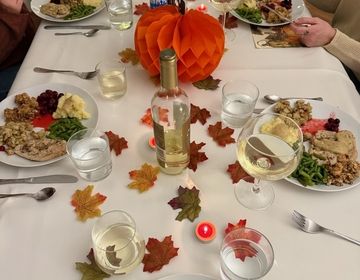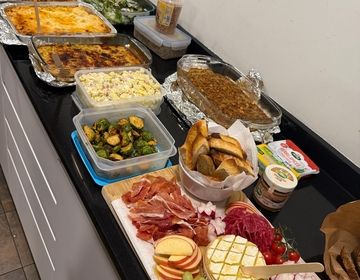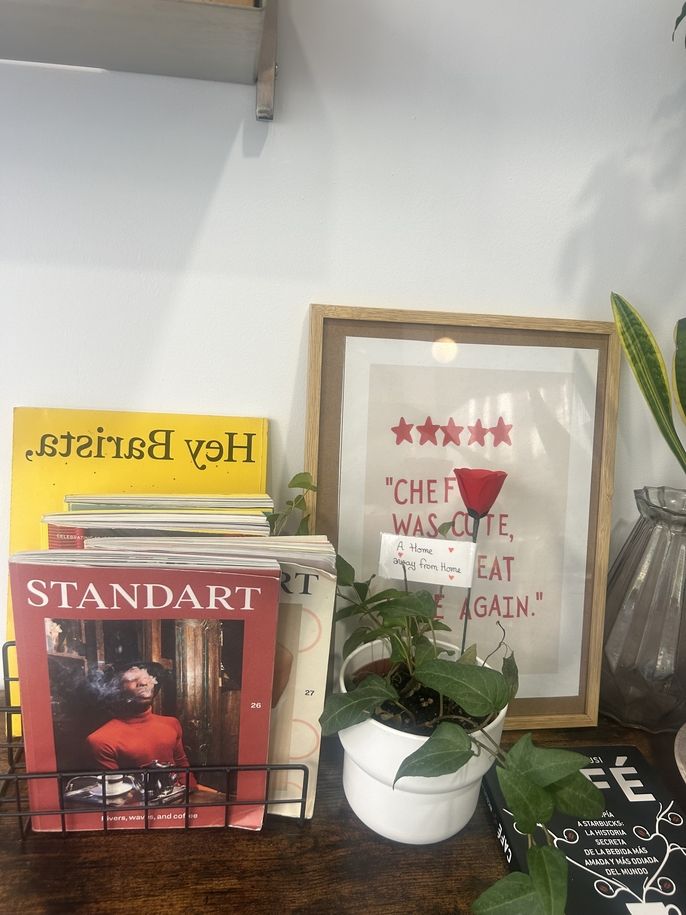¿Hablas inglés?
I’m someone who took Spanish classes for 7 years. I had two years while in middle school and four throughout high school. My knowledge of Spanish is okay but far from being fluent. Though I enjoyed my Spanish classes and did pretty well as a student, it's been years since then and I’ve not kept up with my practice. In the months leading up to my departure, I did Duolingo everyday and have kept my streak going now yet I still lack confidence when speaking.
I can do fairly good with reading menus and documents, as well as understanding what people around me are saying but fully a deer in headlights when I need to try to say anything outloud. I’d say about 75% of people I’ve encountered are able to speak English but there have been some instances where people don’t at all. When I studied in Florence, there were never any issues with the language barrier and everyone spoke English so I was expecting it to be the same here especially with it being such a large, touristy city. Although learning a new language is daunting and it is very intimidating to speak to native speakers, I think they do appreciate it when you try and it is important to try to learn.
Each day presents a new opportunity to learn more Spanish and feel more comfortable when speaking it. I’ve started using some free tools to help me expand my knowledge and I am here to share those.
- Duolingo- This is more for fun and honestly doesn’t actually help much. I think if you did more than one lesson a day it could be more beneficial, but personally I just do it before bed to keep my streak going. I think committing to 20-30 minutes a day doing lessons could help. There are other apps but I haven’t tried them out yet but I think doing this on your commute could be a good way to get some basics down.
- Podcasts- I’ve listened to Coffee Break Spanish which has many seasons going from beginner lessons all the way to more advanced ones. I’ve started on the early seasons and have listened to some episodes more than once to get things now. It covers basics like ordering at a restaurant, going to the grocery store and more. There are also some where the hosts have a conversion in Spanish and then break it down in English. I’ve also listened to Simple Stories in Spanish which is more intermediate but is a great way to listen for grammar and pronunciation. I’ve heard people recommend the Duolingo podcast as well.
- TV Shows/ Movies- Netflix has a ton of great Spanish shows and films you can watch with the English subtitles on. This requires a lot of focus and for someone like me with a short attention span, I really have to zone in. My favorite Spanish show is El Internado. My high school curriculum had us watch this show in class and it was amazing and I’ve started rewatching it now as I’m trying to learn again. Other popular ones I’ve had recommended to me include Cable Girls, Money Heist and Elite. I’ve also heard of people watching their favorite shows like Friends or Modern Family in Spanish instead of English. This can be a great way to hear conversations and expand your vocabulary.
- Google Translate- Using google translate anytime you hear a new phrase or word can really help with learning everyday language. Google translate has a photo feature so you can use it when looking at a label on something when shopping or on any documents. The most important part is trying to remember what you’ve learned so taking note of any new words and making lists from what you’ve had to translate can help.
- School! Although our job here is to help with teaching English, your school can be a great way to learn some Spanish. For me, hearing the kids talk has helped a lot and although I need to get them to speak English, it's great immersion to hear it, especially from children who talk slower and more simply than adults do. You can also practice speaking with your teachers when the kids aren’t around. Most of the teachers at my school speak English but some don’t so trying to communicate with them can be a helpful free tool.
- Language Exchange- This one I haven't tried yet but I have heard of language exchanges at bars or cafes where native Spanish speakers who are trying to learn English will go and other people trying to learn Spanish will go. This can be a good way to practice amongst other people trying to learn. It is definitely intimidating to speak to native speakers but when you're learning and you're there for the purpose of practicing, this can help take away the scary aspects.
- Workout classes- This one isn’t free but I’m including it because it has helped me learn some new words. I am a workout class fanatic and there are a lot of options for fully English classes at some places, but many places will teach in only Spanish or in both languages. I’ve taken a few fully Spanish classes and am able to do well by just following along and over time I’ve learned some of the cues and can understand (in the simplest sense) what they are saying. The bilingual classes are great because you can hear it in both languages. This is a great way to immerse yourself and doesn’t require any speaking on your end.
There are SOO many ways to get better at Spanish and it takes time and some commitment but I think it would be so worth it to be able to communicate with ease in everyday settings. Knowing the basics is paramount but expanding from there has so many advantages. I’m working on building my confidence when speaking and challenging myself everyday to learn something new.
Related Posts

An American in Spain: Thanksgiving Edition
Where to find ingredients in Madrid for a classic Thanksgiving dinner!

A Long Overdue Update from Spain
Long time no blog! I’m so sorry for the radio silence. Life has been life-ing lately — school started, presentations and lesson planning kicked in, I got sick (more than... keep reading

A Week of Eats in Madrid
Episode 3 (8 Must-Try Spots for Sweet Treats & Café Lovers) Exploring Madrid’s food scene has quickly become one of my favorite parts of studying abroad. The city is full... keep reading


